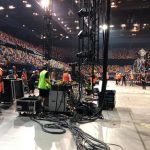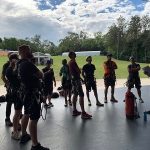FEATURE: Dee Dimmick – Hail To The Crew Chief
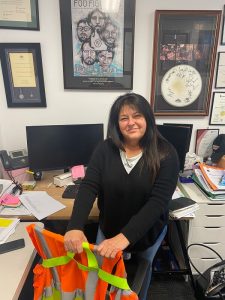
Dee Dimmick – Crew Chief and Managing Director of All Access Crewing.
Words: Matt Innes
No history of Australian roadies could ever be complete without mentioning the contributions of Dee Dimmick. Indeed, the Australian music industry we know today would not even exist.
For the past 25 years, Dee has owned and operated All Access Crewing, a Brisbane-based company that provides the essential crews of riggers, stagehands and technicians without whom the show would simply not go on.
In this role, she has also motivated significant reform in the music industry to improve working and living conditions for roadies. When Dee started working in live production during the 1980s, roadies were little more than workdogs thrown a scrappy bone for their labour.
“It was terrible,” Dee says.
“People were lucky to get paid. It was like ‘do you want whitegoods? Drugs?’ Anything but money. Then, ‘oh look, you owe me this now because you’ve ticked up this amount of drugs so you’re going to work for me for however long without getting any payment.’
“It was horrible, and that was one of my driving things – I wanted to make this industry legit, I wanted to make it so that those people who are working are getting paid every week, and getting paid whether the employer is paid by a festival or not. They need to be paid, that’s what they are there for.”
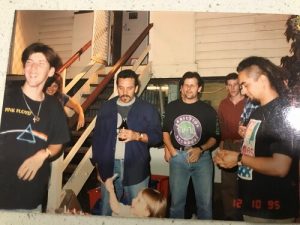
The beginning of All Access Crewing, 1995.
25 years later, Dee is the matriarch of a crewing dynasty, a mother to every person who has ever worked a show under her chiefdom. She views All Access as a family; every person who signs on under her watch is a son and a daughter, each one a valued member of the team.
All Access itself is a family business. Her eldest son Scott followed in Dee’s footsteps to become one of Australia’s top riggers, while her daughter Chrissy oversees the administrative side of the business as well as touring the world with Michael Bublé as a production assistant. Dee’s husband Manny Economidis is highly-regarded among the elite of world-touring riggers and on any All Access show, there’s always a handful of Dimmicks and Economidis’ on-site ensuring smooth and safe operations.
Dee is also one of the first female riggers in Australia, making her a pioneer in her field and tough as nails to boot. In the hierarchy of a crew, riggers sit in a position of ultimate responsibility. If a lighting truss is to fall, it is the riggers who must answer for the failure. They are the first to arrive and the last to leave.
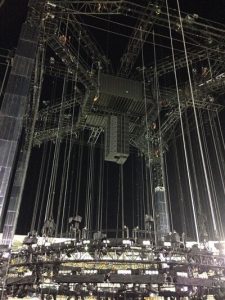
Sound and lighting rig under construction.
It takes a team of hard and diligent people to achieve the job to perfection, and the All Access rigging team is among the best in the world, led by both Manny and Scott.
“The rigging was when I first started at the Brisbane Entertainment Centre in 1987 when it first opened, and they just started hiring females on the floor. Before that they didn’t want females on the floor but the new people that were there were quite open to that. I did training for rigging and ended up getting my Elevated Work Platform, Intermediate Rigging and still doing teching on the floor.”
When Dee started All Access Crewing in 1995, she unwittingly kicked a hornet’s nest and made herself a target for the ‘old guard’ of the industry, who at the time took umbrage at a newcomer treading on their turf.
“It wasn’t until I decided to open a crewing company that everyone bombarded me and said ‘you can’t do it, you won’t do it, no one will give you the work, it’s already wrapped up, if you try and do that I’ll get rid of you, take you for a boat trip and you won’t come back’. Lots of threats,” Dee reveals.
“In fact, my mother was terrified and said, ‘please don’t do this’, because I was getting threats from people who were in the industry. I couldn’t understand why I was getting threats because I wasn’t competition, they had it all sown up. Then I realised it was because my main aim was to make things better for people working in the industry.”
Until recently, the job of a roadie was traditionally an unglamorous one. There were no training colleges, the work was dangerous and unregulated, and crew were often considered disposable.
Dee is the person that changed all of that, advocating for safer work conditions on-site, providing certified training via her own training college, implementing long overdue Workplace Health & Safety procedures and ensuring crews are paid appropriately for their skilled labour.
“Just because they’re roadies doesn’t mean you flog them to death,” Dee says.
“People weren’t treating them with respect, and they deserve it; without them, your show’s not going anywhere, fella.”
There are class-A narcotics that cannot elicit the addictive rush of working on a rock show. Being a roadie is more than a job: it is a lifestyle, one that chooses you and rarely the other way around.
For most, it is a line of work they fall into because they love music, and that passion drives them to take almost any risk to be part of the circus; whether it be driving overnight without sleep, performing dangerous work or simply neglecting their own mental and physical wellbeing.
For this reason, the suicide rate for Australian roadies is a startling 1 in 5, a statistic occurring nowhere else in the world.
“It’s worrying and it’s heartbreaking,” Dee commiserates, “and that’s why from my perspective we’re always saying to the guys, ‘if you need anything, call us, we’re here’. If they just need to talk or need food or whatever… but they don’t always do that.
“They’re tough and they’re proud and they’re more inclined to talk to a peer than to us, even though they know we have their best interests at heart. [They are] worried they may not get their next job and to me they’re like my family, they are an extension of my family, so I feel quite responsible for them in a sense. I don’t want anything like that to happen on my watch.”
Recent years have seen increased focus on the plight of Australian roadies, with organisations such as CrewCare and Support Act working to help those in the live production and associated industries.
Dee herself has now established Roadies Retreat, a registered, not-for-profit charity that will work in concert with CrewCare and Support Act in developing a new infrastructure to provide extended care for roadies as they reach the end of their working lives.
“This is for the roadies, not for anyone else,” Dee says of Roadies Retreat.
“Just the roadies who are the backbone of the industry that everyone has always gone, ‘it’s just a roadie, don’t worry about him’. But to me they’re very important and the guys that are getting older and have devoted their entire lives to this industry need to have somewhere they can go.
“Most of them don’t have retirement plans, many of them are estranged from family or they’re on a minimal amount of money. Whilst [All Access] do super, when they started there was no super or anything like that, so they don’t have anything for the future.”
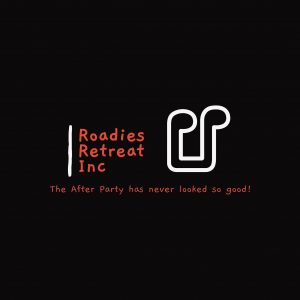
Roadies Retreat is a radical new approach to securing viable retirement opportunities for veterans of the industry.
“We are developing a retreat where these guys can go live in a community of like-minded people and they can support each other, grow produce, and play music. It’s about still having a life purpose in music; just because their work physically may finish their life purpose doesn’t have to because they can still share that music.
“Support Act have given us an amazing support letter for Roadies Retreat, so they’re behind us as well as CrewCare. It’s all relevant what they’re doing, and this is just another piece of the jigsaw.”
Today, the live music industry is in crisis as it grapples with the challenges imposed by a global pandemic. Perhaps unsurprisingly, roadies are the most vulnerable. Where commercial opportunities can be leveraged by musicians via live streaming paid gigs and concerts, no such avenues exist for roadies. For the most part, they have been all but pushed out of the industry.
“It’s quite historical actually,” Dee says of the situation.
“Everyone’s been going through their own turmoil but for us as a crewing company and the stagehands, everything just came to a grinding halt.
“One minute we were in the middle of doing Elton John and the next minute that was it, done. Nothing, absolutely nothing. That was the last thing we worked on. It was like tumbleweeds going down the road; we went from full-on to absolute zero.”
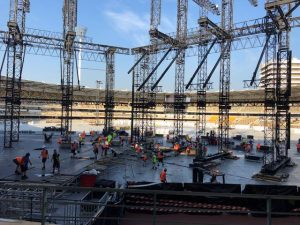
Crews for stadium gigs number 250 personnel.
The pandemic has had a devastating impact on business for All Access Crewing, a company employing hundreds of people. To survive and retain the valuable skill-bank, Dee was able to keep a core crew of just 40 people through the JobKeeper programme.
There has been no other financial aid for roadies – they weren’t even considered a valuable enough part of the industry to be included in the Morrison government’s $250 million arts rescue package. As such, most have moved on to other work.
“It’s scary that we’re going to go back and nobody will know anything, and what touring production people will be left? Because they have to go off and earn a living, so when it all comes back and we need sound guys and lighting guys, where have they gone in the interim?” Dee says.
“Now they’re saying [touring acts] may not bring that entourage with artists, so they won’t bring 50 sound guys and lighting guys, they’ll have to pick up the bulk from Australia, which they could have done at some point but I’m not sure how that will go now.
“What do you bounce back to? And what if you come out here with a Lady Gaga stadium event? Who’s going to do it?”
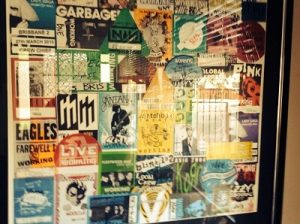
Just a handful of shows worked by Dee and All Access Crewing.
There is no show without a trained, professional crew – it’s simple economics, an unwritten law of physics. As it stands, Dee says Australia is facing a major skilled labour shortfall in the live music industry with massive financial consequences.
“It will be a whole lot of recruiting and re-training again, and then that’s going to cost as well,” she says of what it will take to rebuild the workforce if and when live music returns in earnest.
For now, it is a waiting game. All Access Crewing is in an indefinite holding pattern as Dee and her family hold fort. Nevertheless, Dee still looks forward to her future with All Access and beyond.
Given the return of the live touring cycle to Australia, Dee envisions one day handing the company reins to her children and keeping the All Access Crewing family legacy alive into the next generation.
“The legacy is that it gets bigger, better and stronger,” Dee says.
“They know how I like it done and they do it the same way. I feel completely confident in leaving it with them and knowing they’ll treat it the same way.”
There is nothing – be it threats from malcontents, a global pandemic or even wild horses that could drag Dee Dimmick away from the Australian music industry, and she vows to pursue a better life for roadies well after her benevolent reign of All Access ends.
“I love the industry, I love the crew, I love working in this music life, I love it,” she beams.
“So, the Roadies Retreat is something that I can give my time and efforts to as well now, and slowly do my own thing and do what I want to do.”
Such a statement begs the question: what does a woman like Dee Dimmick – crew chief, music industry pioneer and mother-to-many – want from the next phase of her life?
“I’ve done a lot of things but I’m very much a believer in that the Universe will lead you to where you’re meant to be. So, it will happen when it’s meant to, and I will know it,” she says.
“You’ve got to keep busy and keep that purpose. It’s important to keep going; if you stop, you might as well curl your toes. You’ve got to contribute to society as much as you can while you still can.
“And then, lax on the beach and fish.”
